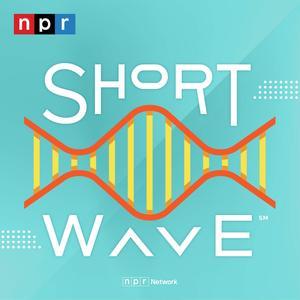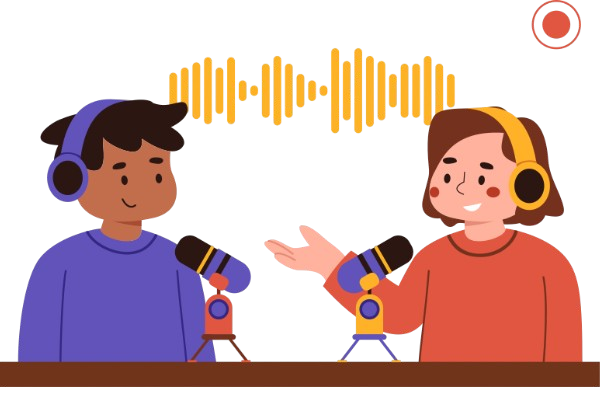Short Wave Zusammenfassung
Erhalte die neuesten Folgen und Zusammenfassungen von Short Wave direkt bei uns.

Der Short Wave Podcast
"Short Wave" ist ein faszinierender Podcast, der die Welt der Wissenschaft auf eine zugängliche und spannende Weise erkundet. In jeder Episode nehmen die Gastgeberinnen Emily Kwong und Regina Barber die Zuhörer mit auf eine Reise durch neue Entdeckungen und alltägliche Rätsel, die die Schlagzeilen prägen. Mit einer Länge von unter 15 Minuten bieten die Episoden eine kompakte und dennoch tiefgründige Betrachtung aktueller wissenschaftlicher Themen.
Der Podcast richtet sich an alle, die sich für die Wunder der Wissenschaft interessieren, unabhängig von ihrem Vorwissen. Emily und Regina schaffen es, komplexe Themen mit Kreativität und einer Prise Humor verständlich zu machen. Dabei decken sie ein breites Spektrum an Themen ab, von bahnbrechenden Forschungsergebnissen über faszinierende Naturphänomene bis hin zu den wissenschaftlichen Grundlagen alltäglicher Ereignisse.
"Short Wave" ist mehr als nur ein Informationskanal – es ist eine Einladung, die Welt durch die Linse der Wissenschaft neu zu entdecken. Ob beim morgendlichen Kaffee, auf dem Weg zur Arbeit oder beim Entspannen zu Hause, dieser Podcast bietet eine erfrischende Perspektive auf die Welt um uns herum und lädt dazu ein, Neues zu lernen und zu staunen.
Die besten Podcasts, ganz einfach.
Erhalte kurze und aufschlussreiche Zusammenfassungen deiner Lieblingsshows, per E-Mail, jeden Tag.
So funktioniert es

Schritt 1: E-Mail eingeben und verifizieren
Klicke auf den Verifizierungslink, den du von uns per E-Mail erhältst.
Schritt 2: Wähle aus 593 Podcasts
Wähle die Podcasts, für die du Zusammenfassungen erhalten möchtest.
Schritt 3: Erhalte Zusammenfassungen
Erhalte Zusammenfassungen in deinem Posteingang, sobald eine neue Folge erscheint.
Melde dich kostenlos an.
Kostenlos starten!Bereits Mitglied? Konto verwalten.
Letzte Episoden:
-
The Great Space (Clock) Race
Veröffentlicht am: 06.01.2025
There are hundreds of atomic clocks in orbit right now, perched on satellites all over Earth. We depend on them for GPS location, Internet timing, stock trading ... and space navigation?Today on the show, hosts Emily Kwong and Regina G. Barber learn how to build a better clock. In order to do that, they ask: How do atomic clocks really work, anyway? What makes a clock precise? And how could that process be improved for even greater accuracy?For more about Holly's Optical Atomic Strontium Io...
There are hundreds of atomic clocks in orbit right now, perched on satellites all over Earth. We depend on them for GPS location, Internet timing, stock trading ... and space navigation?Today on the show, hosts Emily Kwong and Regina G. Barber learn how to build a better clock. In order to do that, they ask: How do atomic clocks really work, anyway? What makes a clock precise? And how could that process be improved for even greater accuracy?For more about Holly's Optical Atomic Strontium Ion Clock, check out the OASIC project on NASA's website.For more about the Longitude Problem, check out Dava Sobel's book, Longitude. Listen to every episode of Short Wave sponsor-free and support our work at NPR by signing up for Short Wave+ at plus.npr.org/shortwave.Have questions or story ideas? Let us know by emailing shortwave@npr.org!Learn more about sponsor message choices: podcastchoices.com/adchoicesNPR Privacy Policy
-
Jimmy Carter's Triumph Over The Guinea Worm
Veröffentlicht am: 04.01.2025
Funeral services begin today for former President Jimmy Carter. He died Sunday, at 100-years-old. Carter brought attention to global health challenges, particularly "neglected" tropical diseases like Guinea worm. With reporter Jason Beaubien, we look at that decades-long effort and how science was central to Carter's drive for a better world. Questions or comments for us at Short Wave? Let us know by emailing shortwave@npr.org — we'd love to hear from you! Listen to ever...
Funeral services begin today for former President Jimmy Carter. He died Sunday, at 100-years-old. Carter brought attention to global health challenges, particularly "neglected" tropical diseases like Guinea worm. With reporter Jason Beaubien, we look at that decades-long effort and how science was central to Carter's drive for a better world. Questions or comments for us at Short Wave? Let us know by emailing shortwave@npr.org — we'd love to hear from you! Listen to every episode of Short Wave sponsor-free and support our work at NPR by signing up for Short Wave+ at plus.npr.org/shortwave.Learn more about sponsor message choices: podcastchoices.com/adchoicesNPR Privacy Policy
-
The Dubious World's Largest Snowflake Record
Veröffentlicht am: 03.01.2025
Snowflakes. These intricate, whimsical crystals are a staple of magical wintry scenes, but how big can they really get? Well, according to the Guinness World Record keepers, the "largest snowflake" ever recorded was a whopping 15 inches in diameter. It was spotted near Missoula, Montana in 1887. But Kenneth Libbrecht, a physicist at Caltech, has long been skeptical of that record. So he set out to find what makes a snowflake a snowflake and whether that 1887 record is scientifically po...
Snowflakes. These intricate, whimsical crystals are a staple of magical wintry scenes, but how big can they really get? Well, according to the Guinness World Record keepers, the "largest snowflake" ever recorded was a whopping 15 inches in diameter. It was spotted near Missoula, Montana in 1887. But Kenneth Libbrecht, a physicist at Caltech, has long been skeptical of that record. So he set out to find what makes a snowflake a snowflake and whether that 1887 record is scientifically possible. You can read more about what he discovered here. (encore)Want to share the snowflakes you've spotted this winter? Email us a photo at shortwave@npr.org.Learn more about sponsor message choices: podcastchoices.com/adchoicesNPR Privacy Policy
